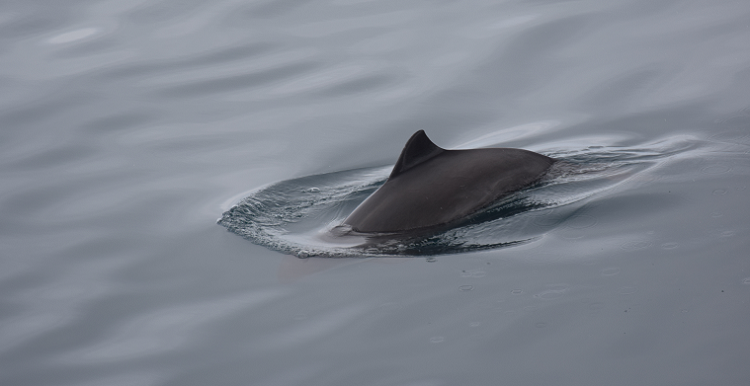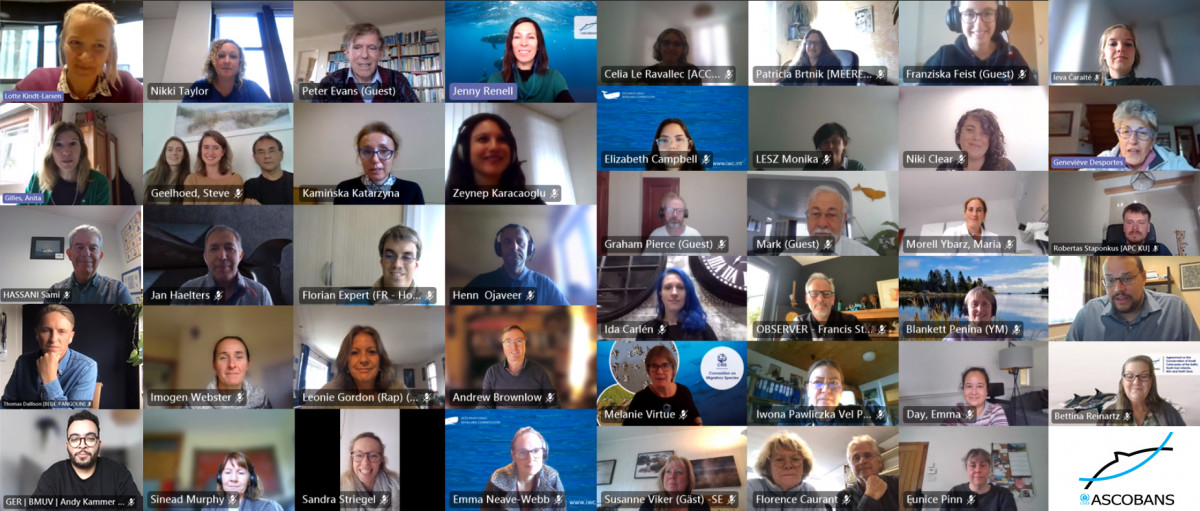27th Meeting of the ASCOBANS Advisory Committee

Harbour porpoise © Hanna Michel.
Bonn, 4 October 2022 - The 27th meeting of the ASCOBANS Advisory Committee (AC27) took place online, for the second consecutive time, from 28 to 30 September 2022. This meeting covered bycatch, resource depletion, marine debris, surveys and research, and use of stranding records, as requested in ASCOBANS Resolution 8.1 (Rev.MOP9). Summaries on these topics were presented according to the answers in National Reports submitted by Parties. Parties also listed successes and the challenges faced in implementing the Agreement. Successes across the Agreement area included increased public awareness and interest to small cetaceans, development of an EU proposal to assess bycatch, consultations with the military on mitigating UXO destruction, marine debris monitoring programmes, and overall support against the mass killing of dolphins at the Faroe Islands.
The meeting considered a report from the Joint Bycatch Working Group of ASCOBANS and ACCOBAMS, and agreed on a recommendation to Parties to ensure their navy acousticians engage with porpoise acousticians, pinger manufacturers and other relevant experts on solutions to enable porpoise protection measures to be implemented. Furthering the topic of bycatch, the meeting heard results of a study on porpoise mortality estimates and bycatch assessments in Danish and Swedish gillnets; updates on the CIBBRiNA project proposal and IWC Bycatch Mitigation Initiative, the MSC certification scheme and fisheries review process, and related activities at ICES and initiatives in the UK.
In relation to prey depletion and the ensuing consequences, especially for small cetaceans, the Resource Depletion Working Group report noted a need for further definition of prey depletion, including consideration of prey quality and reference points, which could be done in collaboration with ICES. Recommendations also included a more comprehensive approach to strandings, particularly to establish better metrics for prey depletion impacts through a focus on overall health assessment rather than merely determining proximal cause of death in cetaceans. This concept was further emphasized as the meeting turned to use of stranding records, where the importance of stranding networks was discussed, and the need for an online strandings data repository was echoed by many participants. A technical workshop was agreed to be organised to take this initiative further.
Parties’ reports on marine debris were heard. While most hotpots did not fall into the ASCOBANS area, ingestion and entanglement are considered the key threats for cetaceans in regard to marine debris. Discussions pointed towards establishment of a Working Group to organise a Marine Debris Workshop as well as recommendations for Parties to improve their data collection at sea, and to continue working closely with IWC on this issue. On surveys, the meeting received updates on CetAMBICion project, SCANS-IV, and the Joint Cetacean Data Programme. The Advisory Committee agreed to put SCANS and SAMBAH on the agenda for each of its meetings, to facilitate preparations for future surveys, lessons learned on practical and analytical considerations, and reporting on results.

This meeting took place when the Nord Stream pipeline had just exploded earlier in the week. The gas leak became a topic requiring urgent consideration, and a Working Group was established to synthesize information on impacts and monitoring. The Advisory Committee also decided to establish a Working Group to provide guidance on the best ways to mitigate impacts of rapid increase in recreational speed crafts.
Concerns over rapid development of offshore renewable energy construction and its impacts on small cetaceans also arose as an urgent action item, especially in the Baltic region where many countries where rapidly moving towards wind power, some in proximity or even inside of Marine Protected Areas. A Working Group was established to review the issue, and to develop criteria for identifying areas of high sensitivity for cetaceans, including consideration of their prey and habitats.
The meeting heard updates on the projects supported by ASCOBANS: use of alternative gears to static gillnets (fishers’ interviews), harbour porpoise cochlear frequency maps, second workshop on management of MPAs, Iberian harbour porpoise, and the coordination of the three regional harbour porpoise action plans. The AC also adopted recommendations from the Common Dolphin Group.
The meeting concluded with electing Katarzyna Kaminska as the AC Chair, and Anne-Marie Svoboda as the AC Vice-Chair. Tentative dates for the 28th Meeting of the Advisory Committee were agreed to 26-28 September 2023. The adopted Action Points and Recommendations are available online, and the full meeting report will be posted in due course on the ASCOBANS website.
Last updated on 16 December 2022


